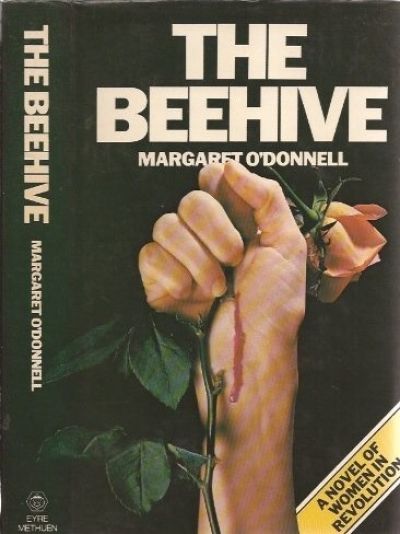Arise Ye Daughters
The Beehive
By Margaret O'Donnell

4 Sep, 2022
Margaret O’Donnell’s 1980 The Beehive is a stand-alone dystopian novel.
A nation is astounded and alarmed by the appearance of political pamphlets in the nation’s mailboxes. Not merely because the pamphlets put forward forbidden views. No, the astounding fact was that the authors of the pamphlets are clearly women. To the astonished men of the nation, it is as though cows and pigs had begun to protest their treatment.
Thirty years ago, an unnamed nation faced with dire economic setbacks turned to Gorston to solve their problems. The visionary delivered, liberating the people from the burdens of democracy and civil liberties. This won universal accolades, at least once Steiner’s secret police got done making sure that insufficiently cautious critics were disappeared.
Gorston’s reforms included the relegation of women to purely domestic roles. However, there was just one small snag: without inexpensive women labourers, the economy would collapse. Faced with this inescapable reality, Gorston introduced further reforms.
At a young age, women are divided into those suitable for marriage and those suitable for work. The first category is married off at a young age, while the second, the Gray Ones, are defeminized as much as possible to mark them as an “other” category. Women’s lives are strictly regimented. Women are conditioned from infancy to accept this sorting, and these roles, as their proper place.
It’s a perfect system … well, except for a few minor problems.
- Thirty years of never hearing the word “no” has undermined whatever ability Gorston might have once had to distinguish between whim and functional policy.
- The dictator is in no way immune to aging and it is clear that he will soon die of natural causes (bearing in mind that natural causes for a dictator include assassination). The mad scrambling for position in a post-Gorston world has already begun.
- Most important, the supposedly perfect female conditioning isn’t.
Women like Sarah Hillard can be found working in strategic positions throughout the nation. They are dismissed as humanoid office equipment. Women like Sarah Hillard are perfectly capable of understanding how unjust their circumstances are. Women like Sarah Hillard are perfectly able to quietly assemble like-minded allies and to plan the overthrow of Gorston’s dictatorship.
Sarah’s bold plan could well fail. If it does, she will spend her final days in prison, if Steiner does not murder her first. For Sarah and those like her, freedom is worth the risk.
~oOo~
The author does not identify where this is set but the setting is consistent with Ireland, the nation where author O’Donnell campaigned for legalized contraception.
There is one male character who plays a pro-Rising role in the novel, artist Carl Nesbitt. Although born in the nation, he was raised elsewhere and could not be bothered to do even minimal research into his nation of birth when he was offered a lucrative commission decorating a Gorston-glorifying monument. Thus one of his roles is to be the outsider to whom Sarah patiently explains how things got the way that they are. Beyond that, let’s just say Carl means well.
Part of Gorston’s sleight of hand in the early days was to create the illusion of low unemployment and economic prosperity by transferring jobs and wealth from women to men. While this was not always workable (there were many jobs men considered beneath them, thus the Gray Ones), it was workable enough for the dictator’s purposes. Success was not entirely economic in nature; men already considered women second-class citizens and were perfectly comfortable relegating them to domestic animal status. While Steiner’s secret police do their bit suppressing dissent, the only male character who has any qualms about the system is Carl.
The contempt in which women (especially the Gray Ones) are held by men is a key part of Sarah’s scheme. Women control key parts of the infrastructure because men are too lazy to do certain low status but important jobs themselves and are incapable of imagining women who do not conform to their narrow views of how women think and act. Even Steiner, whose job it is to outthink dissidents, has this blind spot.
The novel takes an ambivalent stance regarding successful the post-Rising reforms will be in the long run. The Rising’s success required a perfect confluence of careful planning and unpredictable circumstance. As far as we can tell from the novel, at least half the nation is perfectly happy with stripping women of their rights. Sarah is well aware of the challenges ahead but the novel ends before we see how effectively the Rising can manage crucial reforms.
This is a competently written dystopic thriller: Steiner is doing his best to uncover and detain enemies of the regime; the Rising is doing their best to elude him. Both sides are scrambling to deal with unforeseen factors, such as Gorston’s rapidly declining health.
I found this a good read and am puzzled as to why the novel is so obscure. It seems to have had just the one printing forty-two years ago. However, used copies are inexpensive and (IMHO) the novel is worth hunting down.
The Beehive is out of print.
